
The St Kilda Football Club, nicknamed the Saints, is a professional Australian rules football club based in Melbourne, Victoria. The club plays in the Australian Football League (AFL), the sport's premier league.
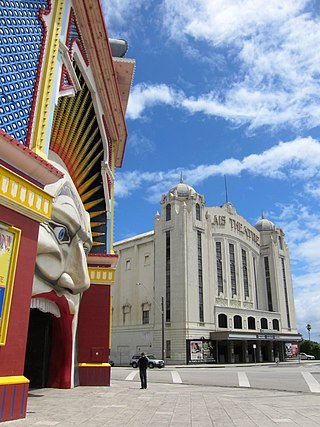
St Kilda is an inner seaside suburb in Melbourne, Victoria, Australia, 6 km south-east of the Melbourne central business district, located within the City of Port Phillip local government area. St Kilda recorded a population of 19,490 at the 2021 census.

Arthur Herbert Tennyson Somers-Cocks, 6th Baron Somers,, was a British Army officer who was the 16th Governor of Victoria, from 1926 to 1931 and Administrator of Australia in 1930-31. He had a long involvement with the Boy Scout Movement and became the Boy Scouts Association's Chief Scout of the British Empire from 1942 until his death.
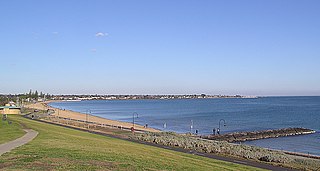
Elwood is an inner suburb in Melbourne, Victoria, Australia, 8 km south-east of Melbourne's Central Business District, located within the City of Port Phillip local government area. Elwood recorded a population of 15,153 at the 2021 census.

Melbourne Grammar School is an Australian private Anglican day and boarding school. It comprises a co-educational preparatory school from Prep to Year 6 and a middle school and senior school for boys from Years 7 to 12. The three campuses are Grimwade House in Caulfield, Wadhurst and Senior School, both in the suburb of South Yarra.

Caulfield Grammar School is a private, co-educational, Anglican, International Baccalaureate, day and boarding school, located in Melbourne, Victoria, Australia. Founded in 1881 as a boys' school, Caulfield Grammar began admitting girls exactly one hundred years later. The school amalgamated with Malvern Memorial Grammar School (MMGS) in 1961, with the MMGS campus becoming Malvern Campus.

Wesley College is a co-educational, open-entry private school in Melbourne, Australia. Established in 1866, the college is the only school in Victoria to offer the International Baccalaureate (IB) from early childhood to Year 12.

Junction Oval is a historic sports ground in the suburb of St Kilda in Melbourne, Victoria, Australia.
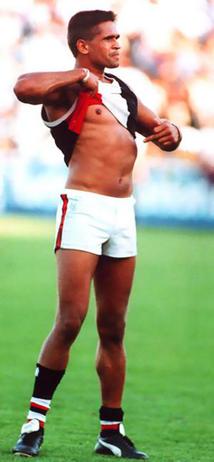
Neil Elvis "Nicky" Winmar is a former Australian rules footballer, best known for his career for St Kilda and the Western Bulldogs in the Australian Football League (AFL), as well as South Fremantle in the West Australian Football League. An Indigenous Australian man, he was the first Aboriginal footballer to play 200 games in the AFL, and was named in the Indigenous Team of the Century in 2005. He was involved in several incidents of racial vilification during his career, and a photograph of Winmar responding to one such incident during the 1993 season has been described as one of the most memorable images in Australian sporting history.
Ian Harlow Stewart is a former Australian rules footballer who played for the St. Kilda Football Club and Richmond Football Club in the Victorian Football League (VFL). He later coached South Melbourne and Carlton before returning to St. Kilda to serve as general manager.
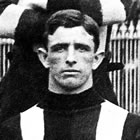
Wellesley Hastings "Wels" Eicke was an Australian rules footballer in the Victorian Football League (VFL).
Corey McKernan is a former Australian rules footballer who played for the North Melbourne Kangaroos and Carlton Blues in the Australian Football League (AFL). A dual Premiership player, a one-time All-Australian at North Melbourne, and a one-time club best and fairest winner and leading goalkicker at Carlton, McKernan was at one time considered to be one of the very best players in the country. He is the older brother to Shaun McKernan, who played with Adelaide Crows, Essendon, and St Kilda.
The 1985 VFL season was the 89th season of the Victorian Football League (VFL), the highest level senior Australian rules football competition in Victoria.

Richard John Taylor was an Australian rules footballer who played for Melbourne and North Melbourne in the Victorian Football League (VFL).
Australian rules football was first organised in Victoria in 1859 when its rules were codified by the Melbourne Football Club.
The Collingwood Football Club is an Australian rules football club playing in the Australian Football League.
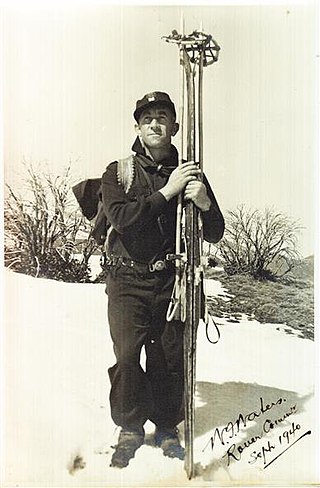
William Francis "Bill" Waters was Scouts Victoria's Headquarters Commissioner for Rover Scouts between 1930 and 1965.

The Anglesea Football Netball Club is an Australian rules football and netball club situated in the township of Anglesea, near the city of Geelong in Victoria.

The Tramway Museum, St Kilda is Australia's principal museum of the 19th and 20th century trams of Adelaide, South Australia. It is situated at St Kilda, 24 kilometres north of the centre of Adelaide. It is operated by the Australian Electric Transport Museum (SA) Inc., a not-for-profit volunteer organisation affiliated with the Council of Tramway Museums of Australasia. It is dedicated to the study, conservation and restoration of trams that were used in Adelaide or built there, and likewise with a small bus and trolleybus collection. Trams provide rides for visitors along a 1.6 km (0.99 mi) purpose-built track between the museum and a large adventure playground.













